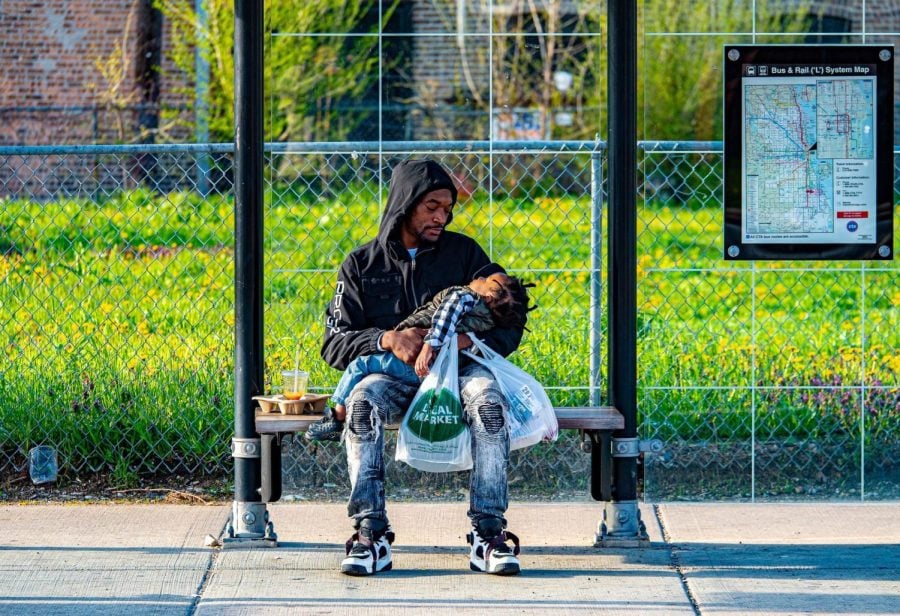Eli Williamson’s ‘Four Virtues’ exhibit highlights loving Black fathers
Photo courtesy of Eli Williamson
Three years ago Eli Williamson said he embarked on a photographic journey to capture loving and virtuous Black fathers. His first exhibit, “The Four Virtues” is running at Evanston Art Center through March 10.
February 9, 2023
Southside photographer Eli Williamson documents loving fathers with their children in everyday settings. Williamson said the mission of his exhibit is to highlight and change the “negative stereotypical perception of Black fathers.”
“As a Black father myself, we’re not seen as virtuous,” Williamson said. “There’s no conversation about the virtuous Black man as a father in society. It’s ludicrous, actually. And it’s really, really poisonous.”
“The Four Virtues,” Williamson’s first exhibit, is running in Evanston Art Center through March 10. It is displayed in the lobby gallery, which is reserved for BIPOC and LGBTQ+ artists.
Evanston Art Center’s Manager of Exhibitions Audrey Avril said the images are rich in color and thematically compelling. Avril said Williamson shows many Black men as fathers expressing compassion, tenderness, gentleness and honorable virtues.
Evanston artist and curator Fran Joy said when she thinks of fatherhood, she imagines direction and protection. She said there is a false sense that such traits are absent in the Black community.
“There’s a lot of really loving (Black) fathers who spend a lot of time with their kids and who are very close and very attached,” Joy said. “That is not really projected that much in general society.”
Paula Danoff (Kellogg ‘82), president and CEO of the Evanston Art Center, said several Black fathers attended the gallery opening and took photos of themselves next to the displayed photographs.
Danoff said many visitors had an emotional response to the intimate images.
“It just gives you such a wonderful feeling of hope and inspiration,” Danoff said. “When you see them all together in the way he’s done it, it’s such a positive view of life.”
Daniel Rogers, a Black father who saw the exhibit, said that while he does not consider himself an “art person,” he appreciates Williamson for telling stories that give dignity to Black fathers. Specifically, Rogers said that photos of fathers walking kids to school, on the bus or in the park resonated with him.
Rogers said he had a difficult relationship with his own father, which he said was due to the unique problems and struggles that come with being a Black man. As a father himself, he said he tries to overcome such obstacles.
“I’m proud, I strive to be there,” Rogers said. “I aspire to be present.”
Williamson said he decided to seriously pursue photography three years ago and has been shooting every day since. He said he finds an abundance of examples of virtuous fathers to shoot.
The damage caused by the negative stereotypes inspires Williamson to capture Black fathers in a positive light.
“I’ve taken some pretty good images of people that have shown them in the best of light,” Williamson said. “And when I say that it’s not because they’re perfect. It’s because they exist. And they’re doing their best.”
Changing the aperture of a camera allows more light in. Similarly, Williamson said if people change their perception, they will see a multitude of examples of loving Black fathers at the movies, at car shows and elsewhere.
The quantity of photos in his displays and photo essays is just as important as their quality, Williamson said, because it demonstrates how common loving Black fathers are. Williamson often gives his subjects the photos he’s taken of them because they have often never had a professional photo taken of them with their kids.
Willard Williamson, Eli’s father and a photographer for over 50 years, said he was proud to see his son depict Black men in a positive light.
“It’s a dimension that we normally don’t see on television and hear about on radio,” Willard Williamson said. “(Black) fathers have to go through (a lot) to raise their kids and to be present for what their needs are. It brings up the challenges of being a Black father. I’m very proud that he put himself out there.”
Email: [email protected]
Twitter: @JackAustinNews
Related Stories:
— Connie Noyes’ ‘we are built in water’ exhibit explores personal and collective grief


